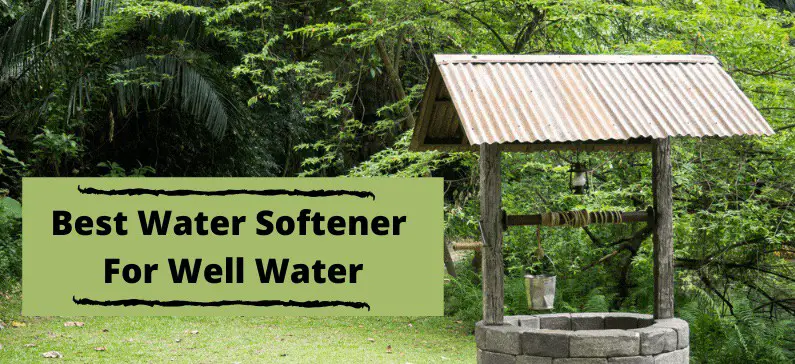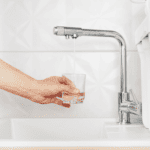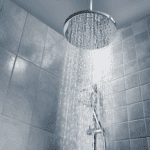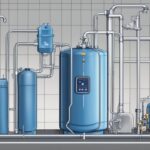Are you trying to decide between installing a water filter or a water softener? Which one is the best choice for you? Many people assume these two products provide the same benefits, but this is not true.
In this article, we will explore the key differences between water filters and water softeners. We’ll look at how they work, the advantages of each product, and when it makes sense to purchase both devices. So you can determine which one is right for you.
The Difference Between Water Filters & Water Softeners
Water Filter
Water filter systems offer a convenient and cost-effective way to purify drinking water. These systems work by removing impurities from the water that can be harmful to drink or use for other purposes. Water filters come in a variety of shapes and sizes, from countertop and under-sink models to whole-house systems.
Water filters purify drinking water by passing it through several stages of filters designed to remove chlorine, bacteria, heavy metals, and other contaminants. In addition, water filters also reduce sedimentation and foul odors in the treated water.
Water Softener
Water softeners help to reduce the hardness of water and improve its quality. They work by removing the minerals like calcium and magnesium from hard water and replacing them with sodium ions. This water-softening process helps to reduce soap scum buildup, prevent scale buildup in pipes, improve the taste of drinking water, and increase the efficiency of heaters.
Water softeners make life more comfortable for those living in hard-water areas. They also can save money on maintenance costs associated with hard-water damage, such as plumbing or appliance repairs due to clogged pipes or inefficient heating elements.
How Do Water Filters Work?
There are several types of water filters, including:
- Carbon Filters: These filters use activated carbon to remove impurities from water. They can remove chlorine, pesticides, and other organic compounds.
- Reverse Osmosis Filters: These filters use a semi-permeable membrane to remove impurities from water. They are effective at removing salt, bacteria, and other contaminants.
- UV Filters: These filters use ultraviolet light to kill bacteria and viruses in water.
- Ceramic Filters: These filters use a porous ceramic material to remove impurities from water. They are effective at removing sediment and other contaminants.
Here’s the step-by-step process of how water filters work:
- Water enters the filter: Water flows into the filter through an inlet.
- Pre-Filter: Before reaching the main filter, some water filters may have a pre-filter that removes larger particles such as sediment, sand, or debris.
- Main filter: The water passes through the main filter media, where impurities are removed. Depending on the type of filter, this may involve adsorption, ion exchange, reverse osmosis, or other processes.
- Outlet: After passing through the main filter, the clean water flows out through an outlet.
- Post-Filter: Some water filters may have a post-filter that further removes any remaining impurities and helps improve the taste and odor of the filtered water.
Water filters require regular maintenance to ensure they continue to work effectively. This may involve replacing filter cartridges, cleaning the filter media, and disinfecting the system.
What Do Water Filters Remove From Drinking Water?
Water filters can remove a variety of impurities from drinking water, depending on the type of filter. Some common contaminants that water filters can remove include:
- Chlorine and chloramines: These are added to many municipal water supplies to kill bacteria, but they can give water an unpleasant taste and odor.
- Sediment and dirt: Water filters can remove particles like sand, silt, and rust that can make the water cloudy or gritty.
- Pesticides and herbicides: These chemicals can be found in some groundwater sources and can be harmful if ingested.
- Bacteria and viruses: UV filters and other types of filters can kill or remove harmful bacteria and viruses from water.
- Heavy metals: Some water filters can remove heavy metals like lead, mercury, and arsenic that can be found in some water sources.
Not all water filters can remove all types of contaminants, and some filters may be more effective than others. Reverse osmosis is the most effective water filtration system that can remove a wide range of impurities from drinking water. However, a reverse osmosis system can also remove healthy minerals during filtration.
Consider using a remineralization filter if you are concerned about losing minerals from your drinking water. It will add back some of these healthy minerals after the water has been filtered through reverse osmosis.

How Do Water Softeners Work?
There are several types of water softeners, including:
Salt-Based Water Softeners
These are the most common type of water softeners and work by using ion exchange to remove hard minerals like calcium and magnesium from water. The hard water flows through a resin bed containing sodium ions which attract and replace the hard minerals, resulting in softened water. The system periodically regenerates the resin bed with salt water to recharge the sodium ions and remove the accumulated hard minerals.
Salt-Free Water Conditioners
These systems do not remove hard minerals from water but instead alter the chemical structure of the minerals to prevent them from forming scale buildup. They use various technologies, such as chelation or template-assisted crystallization, to treat hard water.
Magnetic or Electronic Water Softeners
These systems use magnets or electronic pulses to alter the charge of hard minerals, making them less likely to stick to surfaces and form scale buildup. However, their effectiveness is not great, and they are not as widely used as salt-based systems.
Regular maintenance is required for water softeners to operate effectively. This includes refilling salt for salt-based systems and periodic regeneration of resin beds.
What Do Water Softeners Remove From Water?
Water softeners are designed to remove hard minerals like calcium and magnesium from water. These minerals are typically present in groundwater sources and can make water “hard.” Hard Minerals can cause scale buildup in pipes and appliances, reduce soap lathering, and shorten the lifespan of water-using appliances.
In addition to calcium and magnesium, water softeners can remove other minerals, such as iron and manganese, that contribute to water hardness. Water softener pre-filters may also remove some impurities like sediment and certain metals. But they are not typically designed to remove other types of contaminants like bacteria, viruses, or chemicals.
It’s important to note that water softeners add sodium to the water through the ion exchange process. For individuals on a low-sodium diet, this may be a consideration. In such cases, a salt-free water conditioner or another type of water treatment may be a better option.
Frequently Asked Questions
How do I know if I need a water softener or filter?
There are a few signs that may indicate whether you need a water softener or filter:
- Hard water: If you notice mineral deposits on your plumbing fixtures or appliances or if your water leaves a filmy residue on your skin, clothes, or dishes, you may have hard water. A water softener can help to remove the minerals that cause hardness, such as calcium and magnesium.
- Sediment, Chlorine, or other odors: If your water smells like chlorine or has a strange odor or taste, you may need a water filter to remove contaminants, rust, sand, chemicals, or other debris.
- Health concerns: If you have concerns about the quality of your water or if you or someone in your household has a compromised immune system or other health condition, you should consider a reverse osmosis water filtration system that can remove bacteria, viruses, or other harmful substances.
It’s a good idea to have your water tested by a professional to determine what type of treatment system would be most effective for your specific needs.
Is a whole-house water filter the same as a water softener?
No, a whole-house water filter is different from a water softener. However, both systems can serve similar purposes in improving the quality of your home’s water supply.
A whole-house water filter is designed to remove impurities and contaminants from your drinking water. This can include sediment, chlorine, volatile organic compounds (VOCs), and other chemicals or particles.
On the other hand, a water softener is specifically designed to remove minerals such as calcium and magnesium from your home’s water. These minerals are responsible for creating “hard water,” which can cause issues such as mineral buildup in pipes and appliances.
Do I need a water filter If I have a water softener?
Yes, even if you have a water softener, using a water filter is still a good idea. Water softeners are designed to remove minerals like calcium and magnesium that cause hardness in water. But they don’t necessarily remove other impurities like chemicals, pesticides, bacteria, and viruses that can be harmful to your health.
A water filter can help to remove these impurities and provide you with cleaner, safer drinking water. In short, a water softener is not a substitute for a water filter. A combination of both can provide you with the best possible water quality for your home.
Should I put a water filter before or after the water softener?
Installing a water filter before your water softener is generally the best approach for ensuring clean and soft water. This is because a water filter is designed to remove impurities from the water before it enters the water softener, such as sediment, chlorine, and other contaminants. If these impurities are not removed first, they can cause damage to the resin beads inside the water softener and reduce its efficiency.Putting a water filter before the softener can also help to prolong the life of your water softening system. The filter will remove any particles that could clog or damage the softener over time.









